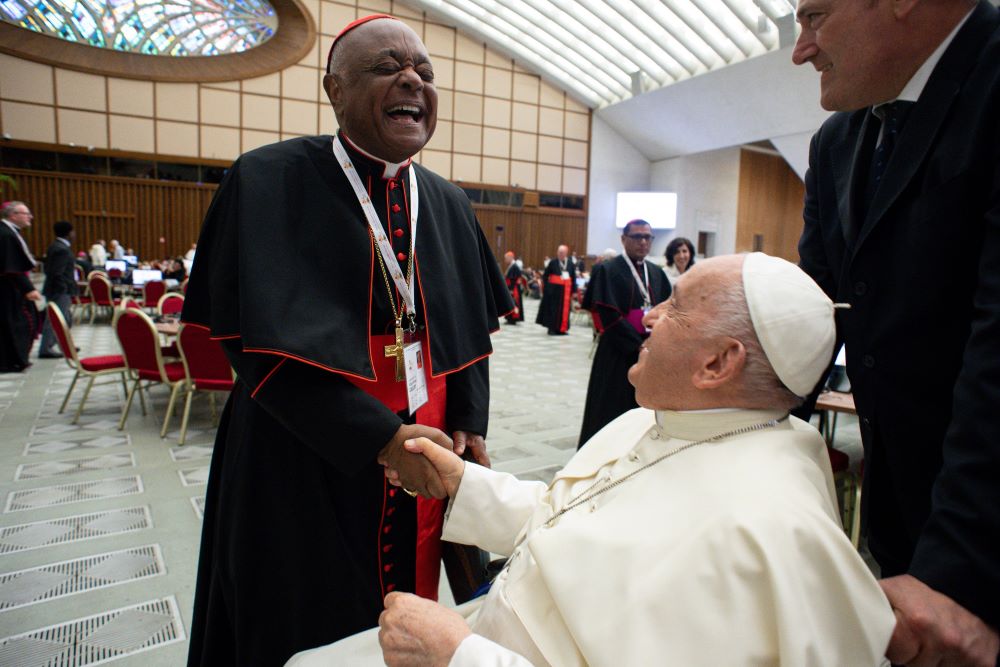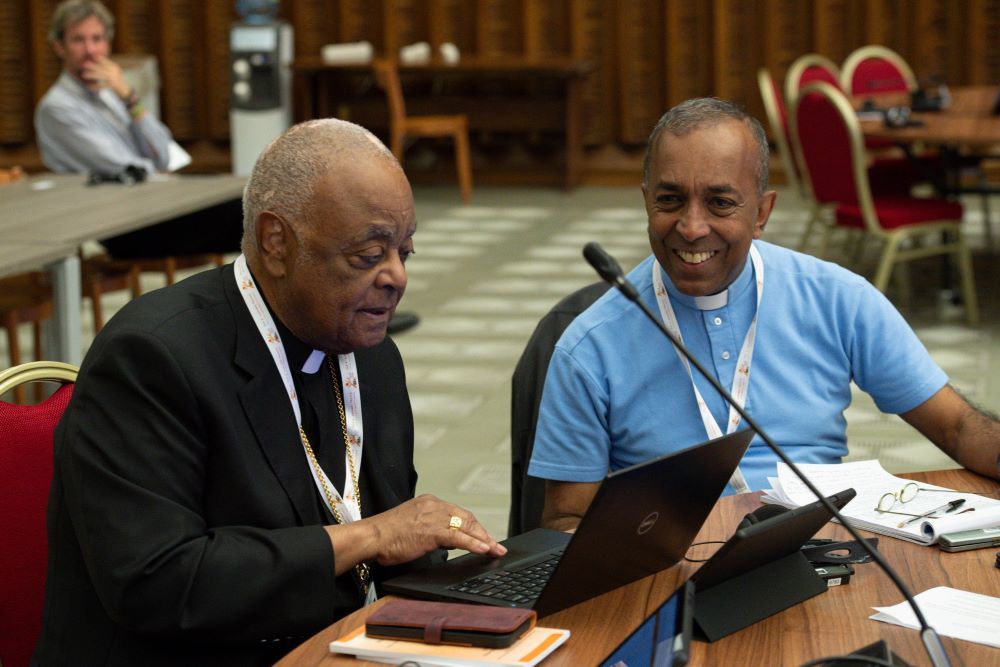
Cardinal Wilton Gregory of Washington shares a laugh with Pope Francis before the first working session of the assembly of the Synod of Bishops Oct. 4 in the Paul VI Audience Hall at the Vatican. Gregory spoke on the legacy of 'Gaudium et Spes' on Pope Francis' writings on March 13 at Sacred Heart University. (CNS/Vatican Media)
Washington's Cardinal Wilton Gregory came to Sacred Heart University March 13 to deliver one of this spring's Bergoglio lectures, commemorating the 60th anniversary of the Fairfield, Connecticut, university and the 60th anniversary of the Second Vatican Council. Appropriately, Gregory spoke on a theme — "The Enduring Legacy of Gaudium et Spes on the Writings of Pope Francis" — that united those two anniversaries with a third, Papa Bergoglio's 11th anniversary as pope.
Gregory invited the audience, a mix of students, faculty and interested Catholics, to "go back 60 years" and reminded us of the circumstances in which the council was convoked: the rebuilding of Europe, coming to terms with the Holocaust, Cold War tensions and massive migration around the world. Out of that very challenging experience, the council issued a call to the church, a hopeful call.
"Gaudium et spes envisioned a more outward-looking and engaged church, responsive to the signs of the time, and committed to the well-being of the human family," Gregory said. "It called upon church members — every single one of us, the clergy, religious, and laity — to influence all societies and cultures by doing several important tasks together, namely: To promote human rights and the dignity of every person; to work for social justice; to act in solidarity with all people, and to advocate for the common good, especially for the poor and needy."
Setting one pope against another is a fool's errand. It is far more important to see how each makes a unique contribution to our understanding of the council.
He then related those goals to the specifics of Francis' 2020 encyclical Fratelli tutti. He ticked off points of correlation between the conciliar text and the papal one on the need for ecclesial engagement with the world, affirming human dignity, the pursuit of social justice, on the necessity of dialogue and encounter, and on the mandate to evangelize.
So, for example, on the subject of human dignity, Gregory said, "Gaudium et Spes underscored the dignity of human beings, who have inestimable value. Throughout Fratelli tutti, Pope Francis reaffirms the dignity of every human person. He asserts that every individual, regardless of their background, status or circumstance, possesses inherent worth and is deserving of respect. This recognition of human dignity serves as the very foundation for Pope Francis' call to fraternity and social friendship in Fratelli tutti."
In the second half of his talk, Gregory turned to the idea of synodality, explaining its etymology and its significance in the life of the church today.

Cardinal Wilton Gregory of Washington and Redemptorist Fr. Vimal Tirimanna of Sri Lanka work during a break at the assembly of the Synod of Bishops in the Vatican's Paul VI Audience Hall Oct. 10. (CNS/Vatican Media)
"Synodality affirms the importance of opening our hearts, minds, and ears to listen to diverse voices with the church, valuing the diverse insights and experiences of all, and seeking consensus through a process of prayerful discernment," he said. "This discernment process involves intentional periods of silent reflection, as we listen to Scripture, to one another and to the Lord in prayer."
Then he linked his experience of synodality, and Francis' teaching about it, with some of the ideas he had earlier unearthed in discussing Gaudium et spes.
"Synodality empowers the faithful to actively participate in the life and mission of the church as we discern together the signs of the time and respond with creativity and courage to the challenges and opportunities of our day," he said. "This is also what Vatican II called us to do in Gaudium et spes."
There are few more important theological — and ecclesial — tasks today than to demonstrate the many and varied ways Francis' magisterium, like that of his immediate predecessors, is rooted in the teachings of the Second Vatican Council. Each pope brought distinctive ways of thinking about the major conciliar themes, and each has contributed to the council's reception throughout the universal church. The conciliar texts are akin to a constitution, and the papal teachings are like statutes that explain or elaborate or implement those constitutional ideas. Setting one pope against another is a fool's errand. It is far more important to see how each makes a unique contribution to our understanding of the council.
Advertisement
Gregory took questions from the audience for more than half an hour, touching on a variety of topics, talking about his own experiences of synodality and, especially, the great deal of prayerful silence that was part of last year's synod. He clearly had been moved by the experience and enjoyed discussing how it is continuing to shape his leadership of a local church.
Gregory possesses to an extraordinary degree the gift of equanimity. He discussed growing up during the Civil Rights Movement, and the hopes that movement engendered and the disappointments that followed, all without rancor or condemnation. Gregory always evidences great sympathy with the human condition. He handled the only edgy question with aplomb.
Most importantly, this lecture was an example of a bishop doing what bishops need to do more of: teach. Gregory drew connections that Catholic students should understand and, if more Catholics understood those connections, fewer people would claim to be "confused" by this pontificate. Gregory's thoughtful and accessible lecture was a great way to celebrate the 11th anniversary of Francis' election.







